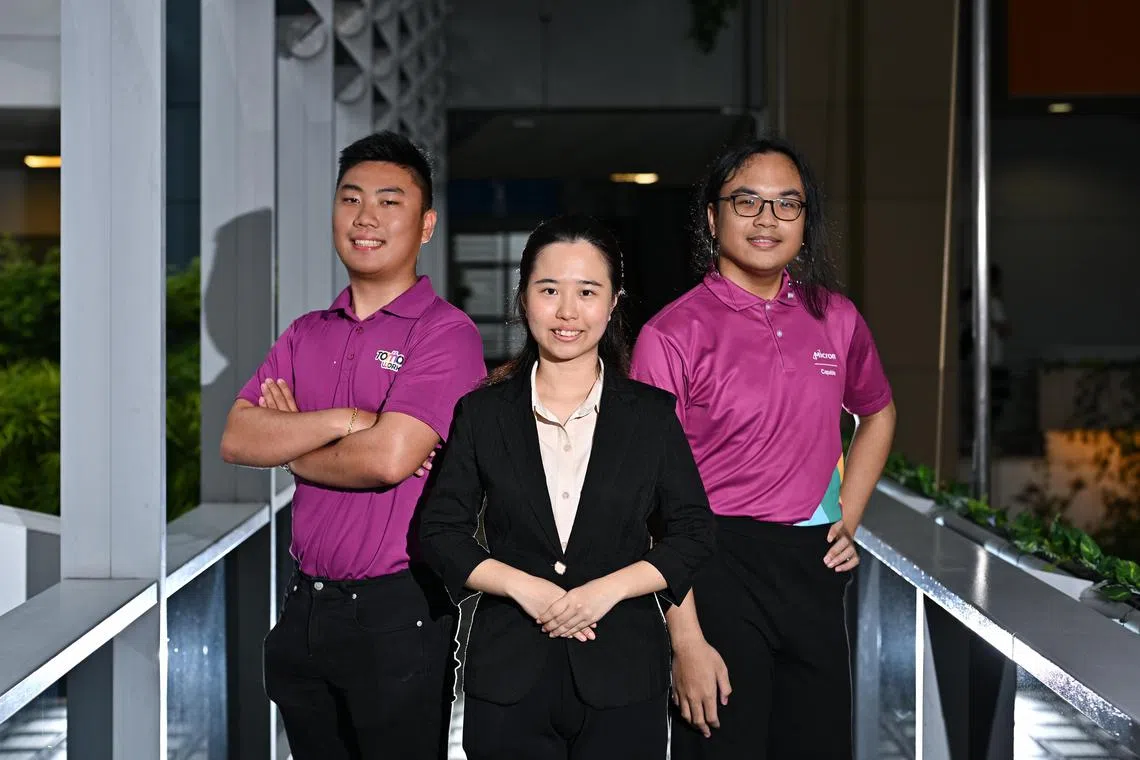S’pore charity’s special programme prepares people with disabilities for work
Sign up now: Get ST's newsletters delivered to your inbox

Among the participants who graduated from TomoWork's programme are (from left) Mr Rayner Teo, Ms Lai Su Ying and Ms Ari Hamed.
ST PHOTO: LIM YAOHUI
SINGAPORE - Jobseeker Lai Su Ying had some issues when speaking to potential recruiters who wanted to have a quick chat with her over the phone before an interview.
Ms Lai, a 19-year-old Temasek Polytechnic graduate who has moderate hearing loss, said some companies might not understand her need for video calls where she is able to read the interviewers’ lips.
She said: “It makes me feel like I’m not really seen.”
In 2011, she started using a hearing aid when she noticed that people around her would sometimes get fed up because she kept asking them to repeat what they had said.
It can be painful when others dismiss her experiences, she said.
But many like Ms Lai have gained immensely from a 12-week school-to-work Talent Accelerator Programme
Ms Lai was among 19 participants who graduated from the programme on June 6.
Since 2021, the programme has helped 85 participants with special educational needs to be more job-ready through mentoring, networking and learning opportunities in partnership with major companies.
TomoWork, which was started in 2019, has helped 295 persons with disabilities and students through tailored assistance, said its chief executive officer Mike Momota.
About 80 per cent of the Talent Accelerator Programme graduates have found jobs within six months of completing the programme, he added.
The programme recruited graduating students and recent alumni with disabilities from various polytechnics and Institutes of Technical Education.
TomoWork celebrated its fifth anniversary at Nanyang Polytechnic’s auditorium on June 6 with about 150 guests from ministries and partner organisations.
Students from the current batch, including Ms Lai, presented their projects to companies such as Micron Technology, Singlife, Swire Shipping and Watson-Marlow Singapore at the event.
TomoWork offers a series of programmes for those with disabilities, such as grants for university studies and skills upgrading.
These provide visibility, awareness and a practical bridge for persons with disabilities to opportunities in society, said the event’s guest of honour, Senior Parliamentary Secretary for Social and Family Development Eric Chua.
“We all just want to be the best version of ourselves,” he said.
“Work and employment are not just about getting a pay cheque at the end of the month. It is also as much about validation, is also as much about a person’s self-worth, dignity and empowerment,” Mr Chua added.
Ms Ari Hamed, who was hired as a digital innovation analyst within six months of graduating from the programme in 2023, said her favourite part of the programme was visiting different companies and learning what their work culture is.
The 21-year-old said the programme allowed for the development of soft skills such as communications and time management.
Ms Ari, who has autism, said companies should look beyond disabilities while hiring and look more at what people like her can bring to the table.
“I may express myself in a way that is different from what is expected,” she said, adding that being compassionate is important to understanding what people with autism go through.
“Some with autism may interpret the world completely different.”
Mr Rayner Teo furthered his studies after graduating from the programme in 2021, and is among the volunteers at TomoWork.
The 23-year-old has Leber hereditary optic neuropathy, which causes blurred vision. He said the skills he learnt through the TomoWork programme are relevant to his current job as an apprentice in the tech and travel industry.
The programme also gave him opportunities to network and gain mentorship on his career journey. Although he graduated from the programme three years ago, he continues to receive mentorship from its mentors. To give back, he returned as a volunteer to share with his juniors what life is like after the programme.
Mr Teo said his company is supportive, such as by giving him more time for the job interview and a magnifying glass to use in the office.
It is important to be open about any disabilities and share what adjustments are needed, he said.
“Reach out to the human resources department directly... share with them what you need, and see whether they are willing to support you during your interview process for the job. That’s where you can tell whether a company is inclusive.”
Ms Lai agreed, saying: “The interview is not just about the person knowing about me; I believe it’s also about me knowing more about the company and what its culture is like.”
Hoping to pursue a career in sustainability, she said the programme has helped her develop workplace social skills and leadership.
Ms Lai added: “We (people with disabilities) are not that much different. I really hope everyone can treat us as equals, not just the hiring managers, not just the workforce. We also can do the same things as everybody else; maybe we need a bit more accommodation and a bit more time.”


